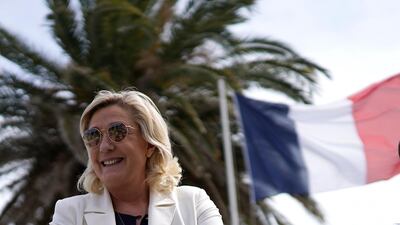France will go to the polls on Sunday in a medley of regional elections which will test the mettle of potential challengers to President Emmanuel Macron.
One of these is far-right leader Marine Le Pen, whose National Rally party is hoping to win a regional presidency for the first time.
Polls are open on June 20 and 27 in a two-round election which comes less than a year before the 2022 presidential race.
The two-round system has long served to keep out the far right because voters would align with whichever candidate emerged from round one as best-placed to beat the National Rally.
But there are concerns that this “republican front” could be fraying, with France’s traditional left and right in disarray and Ms Le Pen in confident mood.
“Last time round she was way ahead in two regions and didn’t win either because of this kind of republican solidarity,” said Dr Paul Smith, an expert on French politics at the University of Nottingham in central England.
“After four years of Macron, are left-wing voters prepared to vote for right-wing candidates in order to stop Le Pen’s party taking control of certain regions?”

Battle on the right
Mr Macron’s Republic on the Move (LREM) party is a relatively minor player at regional level.
But his political future could hinge on the performance of some of his rivals in the centre-right Republicans (LR) party.
LR candidate Xavier Bertrand, who announced a bid for the presidency in March, faces a challenge from the far right in the northern Hauts-de-France region.
While victory would bolster his hopes for 2022, defeat to the National Rally could knock him out of the race.
There will be similar attention on Valerie Pecresse, another potential 2022 candidate from the LR. She is running for re-election in the Ile-de-France region around Paris.
Poor results for Mr Bertrand or Ms Pecresse could strengthen other LR hopefuls such as former Brexit negotiator Michel Barnier.
“What Macron will want to see is the republican right in disarray,” Dr Smith said. “We’re really looking at this kind of wrestling match between the National Rally and the republican right.
“Local elections don’t necessarily tell you what will happen in a national election but they’re taken very seriously as a kind of indicator.”

Le Pen seeks victory
The first round could show the National Rally in an overall lead before the tactical voting begins in the second round.
As the third wave of the pandemic ebbs in France, surveys show that the National Rally’s favoured issues of crime and terrorism are among the leading priorities for French voters.
The issues were kept in the headlines by fatal attacks on the police and an open letter from 20 retired generals warning of a military takeover because of the perceived threat of Islamism.
Mr Macron and others sought to take a tough stance on violence and extremism, mirroring the National Rally.
“We’re at the political heart of the country,” Ms Le Pen said at a campaign stop in the town of Saint Chamond.
Although far-right politicians run some towns and villages, the National Rally has never been in charge of a region.
All 13 regions in mainland France are electing regional assemblies, which have budgets of billions of euros and powers over schools and transport.
Analysts believe the far right's best chance of victory is in the southern region around Marseille and the French Riviera, where immigration and unemployment are above the national average.
Ms Le Pen won the first round in the Provence-Alpes-Cote d'Azur region at the 2017 presidential election.
It helped her reach the run-off which she lost in a landslide to Mr Macron.
Polls suggest that the election in 2022 could come down to a duel between the same two candidates.
Meanwhile, Ms Le Pen could be strengthened by the struggles of the French left, which was heavily beaten at the 2017 election.
Left-wing voters looking to regain strength may be reluctant to back their right-wing rivals in a "republican front", Dr Smith said.
France's Socialist Party could be eclipsed on the left by green politicians who enjoyed a surge in support at the last European Parliament elections.
A strong performance by the ecologists this year could make them the ascendant party on the left and position them for a bid for the presidency in 2022.
“There are a lot of interesting possibilities,” said Dr Smith. “I will be watching avidly.”


